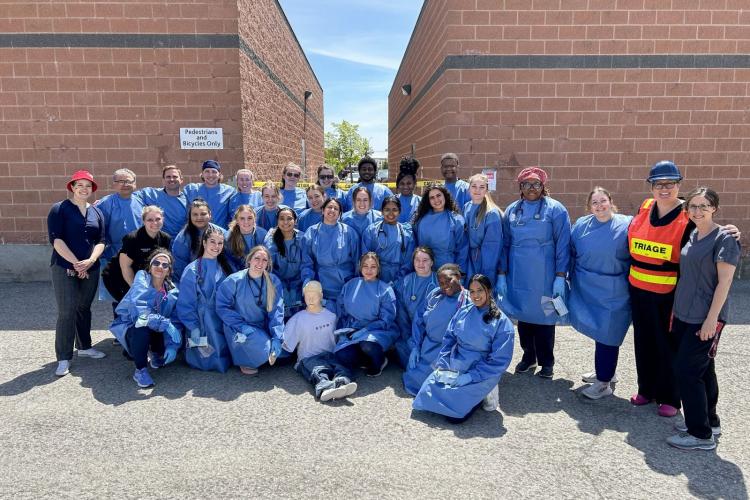
More than two dozen Brock University Bachelor of Nursing/Master of Nursing students participated in a mass casualty simulation. Their instructors played the role of injured patients.
The sound of sirens could be heard as more than two dozen Nursing students dressed in personal protective equipment emerged from Brock University's East Academic building.
While meant to simulate a mass casualty situation, it was not a real emergency.
Graduate students with Brock's Bachelor of Nursing/Master of Nursing (BN/MN) program were training for a "code orange" disaster event in a safe and immersive educational environment on Tuesday, May 7.
As a fog machine filled the alleyway with fake smoke and a speaker projected the sounds of emergency vehicles, 29 students responded to a fictitious scenario involving an explosion in a hospital parking lot that injured six people.
Using reference photos and information posted on the side of the buildings, students were required to rapidly assess high-fidelity mannequin patients and instructors acting as victims to determine their Canadian Triage Acuity Scale (CTAS) scores, which is a five-level triage system for emergency department patients.
Klaudia Greenhalgh, one of the students who participated in the exercise, said the simulation allowed her to apply the skills and knowledge she and her classmates have learned throughout the program.
"The exercise was a really great opportunity for all of us to work together as a team, collaborate, communicate and problem solve through the different patient scenarios," she said. "It was very realistic. The acting and props made it feel very real and helped us prepare for what's next for us as nurses."
The disaster planning exercise is a critical component to nursing education. Students learn how to maintain their own health and safety while assessing patients and prioritizing their care, practise rapid communication techniques and use critical thinking skills to adequately allocate resources.
"Simulated scenarios allow students to recognize knowledge gaps and to learn from their mistakes to refine their skills in a safe environment," said Magdalena Dobosiewicz, Graduate Program Clinical Supervisor of the BN/MN program, who organized the training exercise alongside Nursing Simulation Lab Co-ordinators Rebecca Larocca and Tori McDowell, and Assistant Professor of Nursing Vanessa Silva e Silva.
While literature about emergency response indicates health systems and health delivery in disaster situations are only successful when nurses have the core competencies for rapidly assessing and responding to disaster situations, disaster planning education for nurses is often lacking, said Dobosiewicz.
"In the event of a disaster, nurses play an important role when it comes to adequate patient triage and caring for affected victims and their families," she said. "As we evolve in simulation education at Brock Nursing, we plan to develop larger scale disaster simulations using a collaborative approach between Brock and local health partners to improve the quality of care in the Niagara region even more."











